Introduction
Nelson Mandela stands as a towering figure in the annals of history, a beacon of hope and resilience whose life and work transcended the boundaries of his South African homeland to inspire global movements for justice and equality. Born in 1918, Mandela's life was marked by a relentless struggle against the oppressive apartheid regime that sought to dehumanize and disenfranchise the majority black population in South Africa. His journey from a young lawyer to the first black president of South Africa epitomizes a profound commitment to the principles of freedom and human dignity. Mandela's influence extends beyond the political realm; his moral and ethical leadership has left an indelible mark on the world, fostering a legacy of reconciliation and peace. This essay explores how Mandela's strategic choices and unwavering resolve brought about significant societal transformations, not only in South Africa but across the globe.
Mandela's Fight Against Apartheid
Nelson Mandela's opposition to apartheid, a draconian system of racial segregation, was both strategic and deeply principled. His efforts initially took root in non-violent protests, inspired by the teachings of Mahatma Gandhi. Mandela joined the African National Congress (ANC) in 1943, soon becoming a leader in the struggle against racial oppression. His dedication to the cause was evident when he co-founded the ANC Youth League, pushing for a more radical approach to dismantle apartheid (Mandela, 1994). His strategic shift to armed resistance through the Umkhonto we Sizwe in 1961 was a response to the increasing brutality of the apartheid regime, exemplifying his pragmatic approach to achieving justice.
Save your time!
We can take care of your essay
- Proper editing and formatting
- Free revision, title page, and bibliography
- Flexible prices and money-back guarantee
Mandela's arrest and subsequent life imprisonment in 1962 marked a critical juncture in his crusade against apartheid. Despite his incarceration, Mandela became a symbol of resistance, galvanizing international support and drawing global attention to the iniquities of apartheid. As noted by historian Martin Meredith, Mandela's imprisonment "transformed him into a martyr and a potent symbol of resistance to apartheid" (Meredith, 2010). The Free Mandela Campaign gained momentum worldwide, illustrating the global resonance of his fight for equality. Mandela's release in 1990, after 27 years of imprisonment, was a pivotal moment that signaled the beginning of the end for apartheid, culminating in his election as the first black president of South Africa in 1994. His leadership during the transition was crucial; he advocated for reconciliation and nation-building, eschewing retribution in favor of a racially inclusive democracy.
Global Impact and Advocacy for Peace
Nelson Mandela's influence extended well beyond the borders of South Africa, embodying the universal struggle for human rights and justice. His global impact was most notable in his role as a mediator in international conflicts and as an advocate for peace and reconciliation. Mandela's commitment to peace was evident in his efforts to broker resolutions in war-torn regions, such as Burundi in the late 1990s, where his negotiation skills were instrumental in fostering dialogue between warring factions (Sampson, 2011). His ability to transcend political and racial divides underscored his belief in the power of dialogue and understanding to resolve seemingly intractable conflicts.
Mandela's advocacy extended to issues of global health, particularly the fight against HIV/AIDS, which ravaged the African continent during his later years. In a powerful speech at the 2000 International AIDS Conference, Mandela emphasized that "AIDS is no longer just a disease; it is a human rights issue," urging world leaders to address the crisis with the urgency it demanded (Mandela, 2000). His call to action resonated worldwide, catalyzing international efforts to combat the epidemic and amplifying the voices of those affected. Mandela's legacy in global health remains a testament to his enduring commitment to human dignity and equality.
Counter-Arguments and Legacy
Critics of Nelson Mandela's approach to national reconciliation argue that his policies were overly conciliatory, failing to adequately address the deep economic disparities and structural inequalities that persisted post-apartheid. Some contend that the Truth and Reconciliation Commission, while a groundbreaking initiative, did not lead to substantial reparations for apartheid victims or significant socio-economic reforms (Gibson, 2004). However, Mandela's focus on reconciliation was a pragmatic choice aimed at preventing civil war and ensuring a peaceful transition to democracy. His emphasis on forgiveness and unity was, in many ways, a strategic decision to foster long-term stability in a nation fraught with racial tensions.
Despite these criticisms, Mandela's legacy as a transformative leader who embodied the principles of justice and equality remains unassailable. His life's work laid the groundwork for subsequent generations to continue the struggle for human rights and social justice. As Archbishop Desmond Tutu aptly reflected, "Nelson Mandela's life is the story of a courage that soared like an eagle above the clouds of apartheid" (Tutu, 2013). Mandela's enduring influence is evident in the global movements that draw inspiration from his legacy, advocating for social justice, human rights, and equality across the world.
Conclusion
Nelson Mandela's life and legacy continue to serve as a powerful catalyst for change, inspiring movements for justice and equality worldwide. From his pivotal role in dismantling apartheid to his advocacy for global peace and human rights, Mandela's contributions have left an indelible mark on history. While debates about the efficacy of his policies continue, the overarching impact of his leadership in promoting reconciliation and unity is undeniable. Mandela's vision of a world where freedom and equality reign remains a guiding light for activists, leaders, and citizens alike. His legacy endures, reminding us of the power of resilience, forgiveness, and unwavering commitment to justice in the face of adversity. As we reflect on Mandela's life, we are reminded of the profound truth that, as he famously stated, "It always seems impossible until it's done."






 Stuck on your essay?
Stuck on your essay?

